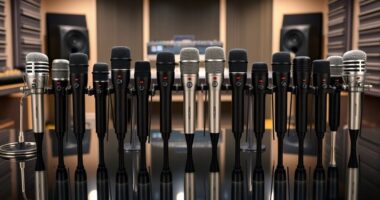If you’re traveling with a CPAP machine, choosing the right battery backup is vital to guarantee you stay powered overnight. I look for options with enough capacity, like around 160Wh to 300Wh, and that support multiple ports for device compatibility. Safety features, lightweight design, and quick recharging matter too. To find the best fit for your needs, I’ve compiled several options—keep going to discover the top picks for portable power on the go.
Key Takeaways
- Choose compact, TSA-approved batteries under 100Wh for hassle-free travel and airline safety compliance.
- Opt for high-capacity models (around 150-300Wh) to support multiple nights of sleep therapy.
- Ensure compatibility with your CPAP device’s voltage and connector type for safe operation.
- Look for portable batteries with multiple ports (USB, DC, AC) to power additional devices simultaneously.
- Prioritize batteries with quick recharge times, durable safety features, and reliable warranties for peace of mind.
EASYLONGER CPAP Battery Backup Power Supply (ES960)
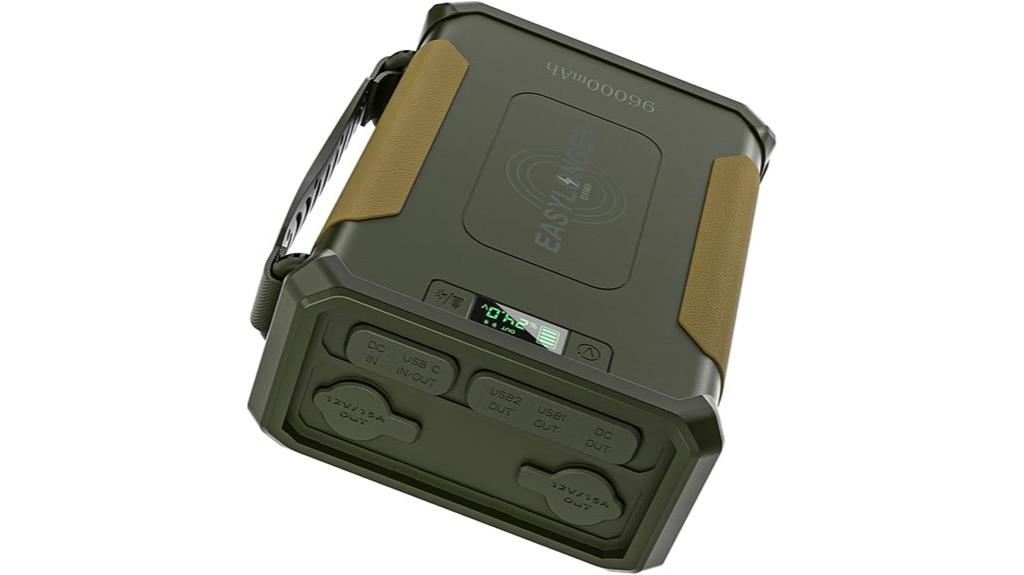
If you’re looking for a reliable backup power supply that can keep your CPAP machine running during outdoor adventures or power outages, the EASYLONGER CPAP Battery Backup Power Supply (ES960) is an excellent choice. It offers 297.6Wh capacity and supports popular models like AirSense 11, DreamStation, and more, with multiple voltage options and compatible cables. Recharging takes just 5-8 hours via Type-C, AC, or solar panel. It powers devices up to 180W, including laptops and mini-fridges, and provides about two nights of backup. With built-in LiFePO4 cells for safety and durability, it’s a versatile, portable solution for on-the-go sleep therapy needs.
Best For: individuals who need a reliable, portable backup power supply for CPAP therapy during outdoor adventures, power outages, or travel.
Pros:
- High-capacity 297.6Wh battery supports about two nights of sleep therapy, ideal for off-grid use
- Compatible with a wide range of CPAP models and other electronic devices via multiple ports and voltage adjustments
- Built-in LiFePO4 cells ensure safety, long cycle life (up to 3000 cycles), and durability for extended use
Cons:
- Recharging requires several hours (5-8 hours depending on the method), which may be inconvenient during urgent situations
- Solar panel (not included) needed for eco-friendly recharging, adding to overall cost and setup complexity
- Heavier (6.6 pounds) compared to smaller portable batteries, which may be less convenient for very lightweight travel
Freedom CPAP Battery Backup Power Supply, 160Wh

The Freedom CPAP Battery Backup Power Supply with 160Wh capacity stands out as an excellent choice for travelers who need reliable power on the go. Its compact size (7.9 x 5.1 x 1.0 inches) and lightweight design (3.7 pounds) make it easy to carry, whether camping or flying. Compatible with popular CPAP models like ResMed AirSense, DreamStation, and Transcend, it offers flexible use, with or without heating elements. The included AC charger ensures quick recharging, and the LED indicator keeps you informed. With a 1-year warranty and durable lithium-ion technology, it’s a dependable backup to keep your CPAP powered during travel or emergencies.
Best For: travelers and outdoor enthusiasts needing a reliable, portable backup power source for their CPAP devices during travel, camping, or power outages.
Pros:
- Compact and lightweight design for easy portability
- Compatible with a wide range of popular CPAP models
- Includes LED indicator and quick-charging AC adapter for convenience
Cons:
- Runtime varies depending on CPAP model and heating features used
- Some models may require additional cables (sold separately)
- Limited to 160Wh capacity, which may not support long-term power needs
Medistrom Pilot-24 Lite CPAP Battery Backup with Cables
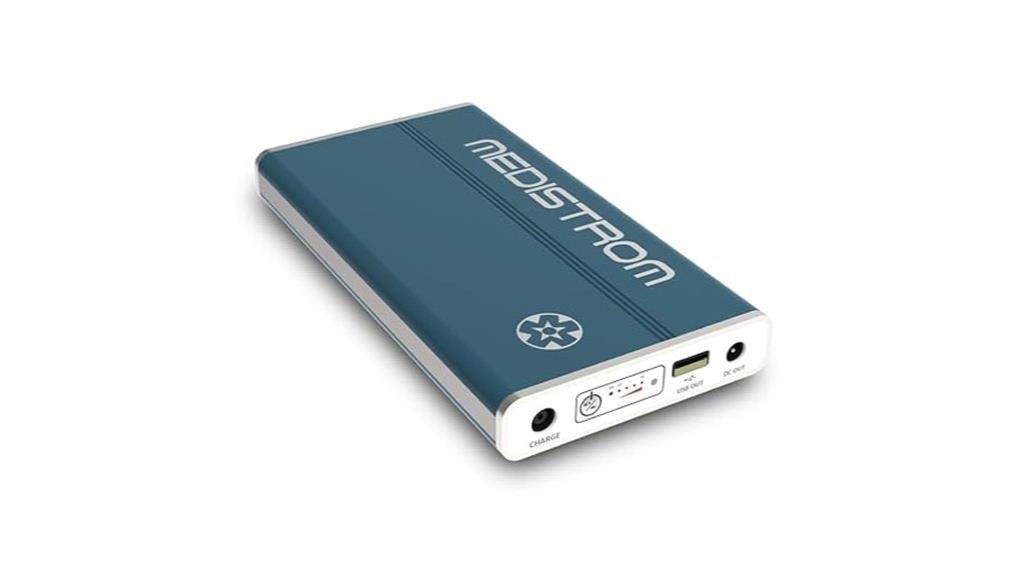
Designed for travelers who need reliable power on the go, the Medistrom Pilot-24 Lite CPAP Battery Backup with Cables offers a compact and straightforward solution. It provides a dependable backup for 24V PAP devices like ResMed S9, AirSense 10, and AirMini, ensuring you won’t wake up to a dead machine. The battery recharges quickly in just 2-3 hours and is easy to set up, with cables compatible with popular devices. Built with durable materials and TSA-approved, FAA-compliant, it’s perfect for travel. Plus, its USB port allows charging other devices, and the built-in flashlight adds convenience during camping or emergencies.
Best For: travelers and CPAP users seeking a reliable, portable backup power source to ensure uninterrupted therapy during power outages or on the go.
Pros:
- Compact, lightweight design ideal for travel and portability
- Rapid 2-3 hour recharge time with versatile charging options
- Built-in USB port and flashlight for added convenience and emergency use
Cons:
- Power adapters are not included, requiring users to purchase compatible cords separately
- Limited to 24V PAP devices; not suitable for higher voltage or different device types
- Capacity of 95Wh may be insufficient for extended use without recharging
ALLWEI Portable Power Station 300W
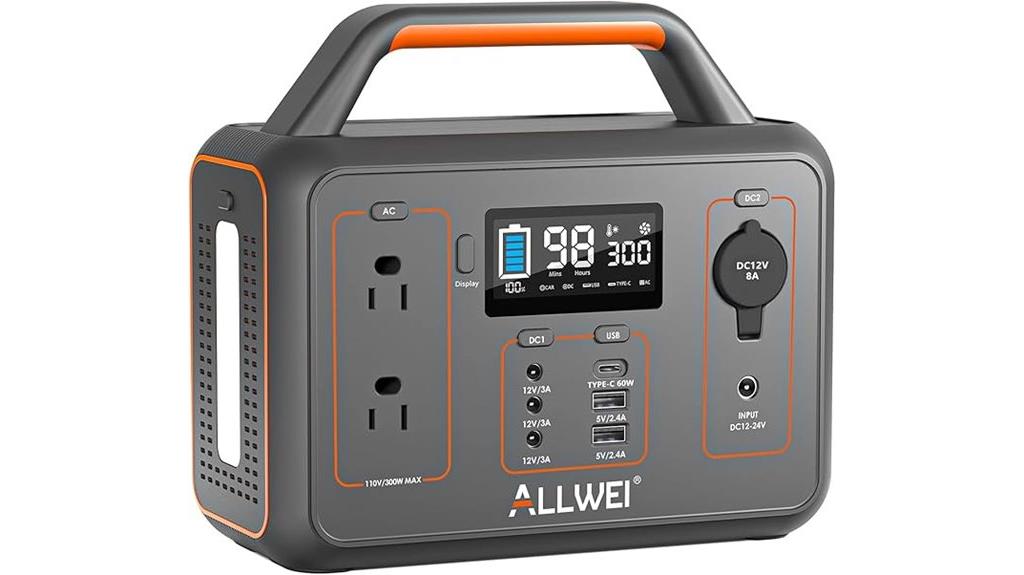
For travelers who need a reliable power source for their CPAP machines, the ALLWEI Portable Power Station 300W stands out because of its lightweight design and multiple charging options. Weighing just 6.5 pounds, it’s easy to carry, whether camping or on a road trip. It offers 300W of power and a 280Wh capacity, supporting devices like CPAPs, phones, laptops, and small appliances simultaneously through various ports, including two AC outlets, USB-C PD 60W, and DC connectors. Charging is versatile—via wall, car, or solar panel—making it perfect for emergency backup or outdoor adventures. Its safety features and long cycle life add peace of mind.
Best For: travelers, campers, and outdoor enthusiasts seeking a lightweight, versatile power source to run essential devices like CPAP machines, phones, and small appliances safely and reliably.
Pros:
- Compact and lightweight design (6.5 pounds) for easy portability
- Multiple recharging options including wall, car, and solar, for versatile use
- Supports a variety of devices simultaneously with multiple ports and pure sine wave outlets
Cons:
- Limited to 300W rated power, which may not support high-wattage appliances
- Longer recharge times when using solar panels in low sunlight conditions
- Noise from the cooling fan during operation could be noticeable in quiet environments
EASYLONGER CPAP Battery Backup Power Supply ES720

If you’re looking for a versatile and reliable backup power supply that can keep your CPAP running during travel or emergencies, the EASYLONGER CPAP Battery Backup Power Supply ES720 stands out. It offers a 266.4Wh capacity, which exceeds airline limits, making it perfect for travel. Compatible with devices like AirSense 11, Dreamstation, and Luna G3, it includes four DC cables for various CPAP brands. The all-in-one design features an adjustable 12V-24V output, a cigarette lighter socket, and USB ports for other electronics. Recharging options include AC, USB-C, solar, and car outlets. Plus, its safety features protect against overcharging and short circuits, ensuring reliable use wherever you go.
Best For: travelers, outdoor enthusiasts, and emergency preparedness users seeking a versatile, reliable backup power source for CPAP machines and electronic devices.
Pros:
- High-capacity 266.4Wh battery suitable for travel and off-grid use
- Wide compatibility with popular CPAP models and multiple electronic devices
- Multiple recharging options including AC, USB-C, solar, and car outlet
Cons:
- Heated tube support is not available for Luna G3 devices
- Requires voltage converter for cigarette lighter connection to match CPAP voltage
- Slightly heavier and bulkier compared to smaller power banks
PO-160UPSv2 159Wh UPS Battery & Backup Power Supply for Medical Devices

The PO-160UPSv2 159Wh UPS Battery stands out as an ideal choice for travelers who need reliable backup power for their CPAP machines, especially during extended outages. It’s compatible with popular devices like Philips DreamStation, ResMed AirSense, Luna, and G3, powering all CPAP, BiPAP, and APAP units sold in North America without extra adapters. Weighing just 2.88 pounds and meeting TSA and FAA travel standards, it’s perfect for on-the-go use. With a long battery life of up to 18 hours, fast recharging in about 4-5 hours, and a handy battery gauge, it guarantees continuous sleep support wherever you are.
Best For: travelers and users needing reliable, portable backup power for CPAP, BiPAP, and APAP devices during extended outages or on the go.
Pros:
- Compatible with popular CPAP brands like Philips DreamStation and ResMed AirSense without extra adapters
- Lightweight and TSA/FAA travel-friendly at just 2.88 pounds
- Long battery life up to 18 hours and fast recharge time of 4-5 hours
Cons:
- Limited to North American-compatible devices, may not support all global models
- Only a 1-year warranty, which may be shorter than some users prefer
- Customer ratings are moderate at 4.1 out of 5 stars from 44 reviews
Pilot Flex 98Wh CPAP Battery Backup Power Supply

The Pilot Flex 98Wh CPAP Battery Backup Power Supply stands out as an ideal choice for travelers who need reliable, portable power for their CPAP machines, thanks to its TSA approval and FAA compliance at 98Wh. It supports both 12V and 24V devices and includes compatible DC cables for popular models like AirSense 11 and AirMini. With up to 16 hours of runtime on a single charge, it’s perfect for extended trips or outdoor adventures. Built with durable aluminum and LG cells, it’s lightweight at just 1.2 pounds. Recharging in 2–3 hours, it fits easily in carry-on luggage, making it a practical, travel-ready power solution.
Best For: travelers and outdoor enthusiasts who require a reliable, portable power source for their CPAP machines during trips, camping, or off-grid adventures.
Pros:
- Supports both 12V and 24V CPAP devices with included compatible cables for popular models like AirSense 11 and AirMini.
- Provides up to 16 hours of continuous use on a single charge, ideal for extended travel or outdoor activities.
- TSA-approved and FAA-compliant at 98Wh, making it safe and convenient for air travel.
Cons:
- Recharges in 2–3 hours, which may be longer compared to some smaller power banks.
- Only includes DC cables for certain CPAP models; additional cables are sold separately.
- Limited to 98Wh capacity, so it may not support very high-power CPAP machines or prolonged use without multiple units.
EASYLONGER CPAP Battery ES400 AIR 148Wh Backup Power Supply

Designed for lightweight, portable CPAP devices, the EASYLONGER CPAP Battery ES400 AIR 148Wh Backup Power Supply is an ideal choice for travelers who need reliable power on the go. It supports popular models like ResMed AirSense 10, AirMini, Philips DreamStation, and more, ensuring compatibility with a variety of devices. With a 148Wh capacity, it can power a lightweight CPAP through a full night’s sleep. The battery features pass-through charging, so you can sleep while it’s recharging. It includes multiple cables, USB ports, and a car socket, making it versatile for camping, RVing, or off-grid adventures. Safety is prioritized with built-in protection systems.
Best For: travelers, campers, and outdoor enthusiasts using lightweight CPAP devices who need reliable, portable backup power solutions.
Pros:
- Compatible with a wide range of lightweight CPAP models including ResMed AirMini and DreamStation
- Pass-through charging allows continuous use during recharging, ensuring uninterrupted sleep
- Multiple output ports (USB, car socket, DC cables) for charging various devices like phones, tablets, and cameras
Cons:
- Not suitable for larger CPAP units with humidifiers or heaters due to limited capacity
- Solar panel charging requires an additional purchase and may take 3-4 hours with an 80W panel
- Heavier and bulkier compared to smaller portable chargers, which may affect portability
EXP48PRO APEX CPAP Battery, Portable Power Supply for ResMed Airsense 10/11, AirMini, AirCurve 10, AirStart 10, Luna G3

If you’re looking for a reliable, portable power solution that can keep your CPAP machine running during travel or emergencies, the EXP48PRO APEX CPAP Battery is an excellent choice. With a 154Wh capacity, it provides 2-3 nights of power without humidifier or heated tubing. It’s compatible with popular models like ResMed AirSense 10/11, AirMini, and Luna G3. Weighing just 3.25 pounds, it’s lightweight and easy to carry. The battery charges fully in 2.5 hours and offers multiple recharging options—AC, DC, solar, and USB-C. Built with durable LiFePO4 technology, it’s safe, water-resistant, and TSA-friendly for hassle-free travel.
Best For: individuals who need a reliable, portable power source to ensure uninterrupted CPAP therapy during travel, camping, or emergencies.
Pros:
- High-capacity 154Wh battery providing 2-3 nights of use without humidifier or heated tubing
- Fast 2.5-hour recharge time with multiple charging options including AC, DC, solar, and USB-C
- Lightweight at just 3.25 pounds with durable, TSA-compliant design suitable for travel
Cons:
- May not support CPAP humidifier or heated tubing during extended use
- Limited to specific output voltages (12V and 24V), potentially incompatible with some devices
- Requires external cords for setup, which may be inconvenient for some users
EnginStar Portable Power Station 300W Battery Bank

For travelers seeking a reliable, portable power source for their CPAP machines, the EnginStar Portable Power Station 300W stands out thanks to its compact design and robust 296Wh capacity. Weighing just 6.5 pounds and measuring 9 x 5.5 x 7.5 inches, it’s easy to carry anywhere. It features 8 output ports, including two pure sine wave AC outlets, perfect for powering sensitive devices like CPAP machines. The digital display, flashlight, and overload protection add convenience and safety. With a built-in inverter delivering 300W continuous power and a lithium-ion battery supporting over 1,000 charge cycles, it’s a dependable option for keeping your sleep uninterrupted on the go.
Best For: travelers and outdoor enthusiasts who need a reliable, portable power source to run sensitive electronics like CPAP machines on the go.
Pros:
- Compact and lightweight design for easy portability
- Features 8 output ports, including two pure sine wave AC outlets suitable for sensitive devices
- Supports over 1,000 charge cycles with a robust 296Wh capacity for long-term use
Cons:
- Limited to a maximum of 300W continuous power, which may not support high-power appliances
- Charging time of approximately 7 hours may be long for urgent needs
- Solar panel compatibility requires additional purchase, as it is not included
Pilot-24 Lite CPAP Battery Backup Power Supply
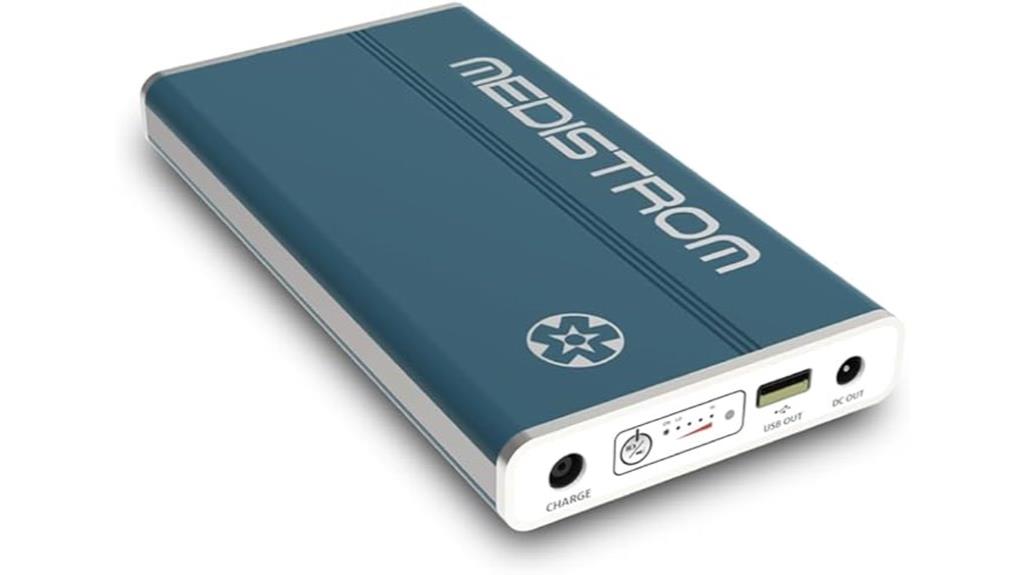
The Pilot-24 Lite CPAP Battery Backup Power Supply stands out as a top choice for travelers seeking a lightweight and TSA-approved solution. Weighing just 1.3 pounds and measuring 2.53 x 1.38 x 1.63 inches, it’s highly portable and perfect for on-the-go use. With a 95Wh capacity, it can power most 24V CPAP machines for up to 16 hours per charge, making it ideal for camping, flights, or emergencies. It recharges in 2–3 hours and features durable aluminum construction with LG industrial-grade cells. Compatible with AirMini and AirSense 10, it’s a reliable, compact backup that meets TSA and FAA standards.
Best For: travelers, campers, and emergency users seeking a lightweight, TSA-approved backup power solution for 24V CPAP machines.
Pros:
- Compact and lightweight design (1.3 pounds, 2.53 x 1.38 x 1.63 inches) for easy portability
- Provides up to 16 hours of power per charge, ideal for extended use or emergencies
- Durable aluminum construction with LG industrial-grade cells ensures long-lasting performance
Cons:
- Compatibility limited to certain CPAP models; cables for some devices sold separately
- Recharges in 2–3 hours, which may be longer than some users prefer
- Customer ratings are good but not perfect (4.0/5 stars), indicating some users may experience issues
Pilot Flex 98Wh CPAP Battery Backup Power Supply
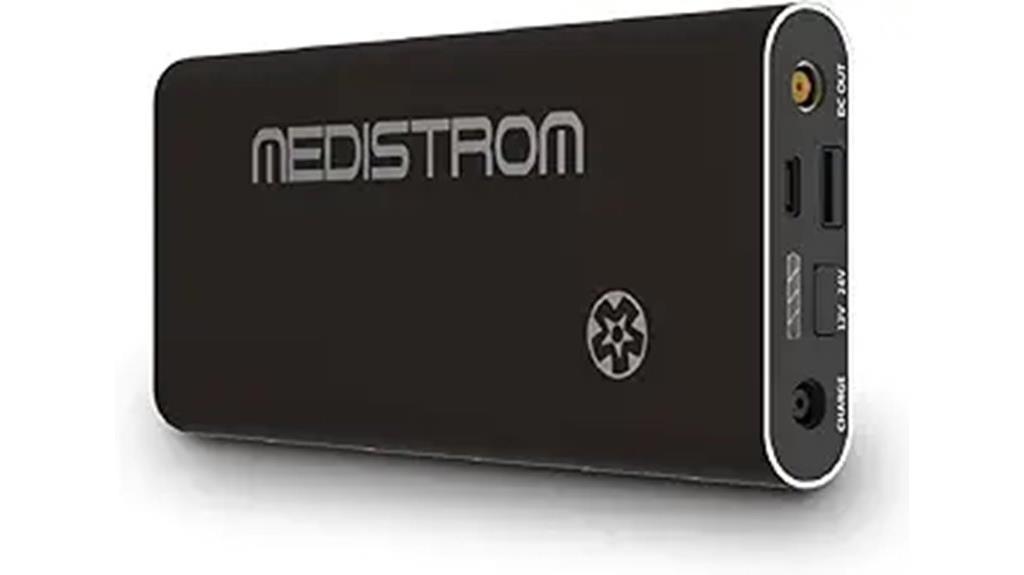
Travelers seeking a reliable, TSA-approved backup power source will appreciate the Pilot Flex 98Wh CPAP Battery Backup Power Supply. Designed for 12V and 24V machines like AirSense 11 and AirMini, it includes two DC cables for easy compatibility. With a 98Wh capacity, it provides up to 16 hours of sleep therapy per charge, depending on your device and settings. Recharging takes just 2–3 hours, making it perfect for travel and off-grid use. Built with a durable aluminum case and LG cells, it’s tough enough for camping or outdoor adventures. Compact and lightweight at 1.2 pounds, it fits easily in your carry-on, ensuring uninterrupted sleep anywhere.
Best For: travelers and outdoor enthusiasts needing a reliable, TSA-approved backup power supply for their CPAP machines during trips, camping, or off-grid situations.
Pros:
- Provides up to 16 hours of sleep therapy on a single charge, ideal for extended travel.
- TSA-approved and FAA-compliant, safe for carry-on luggage and in-flight use.
- Durable construction with a lightweight design, making it portable and suitable for rugged environments.
Cons:
- Limited to 12V and 24V CPAP machines; incompatible with other device types.
- Cables for certain models like AirSense 10 and DreamStation are sold separately.
- Recharging requires 2–3 hours, which may be longer for those needing rapid turnaround times.
Pilot-24 Lite CPAP Battery with Car Charger
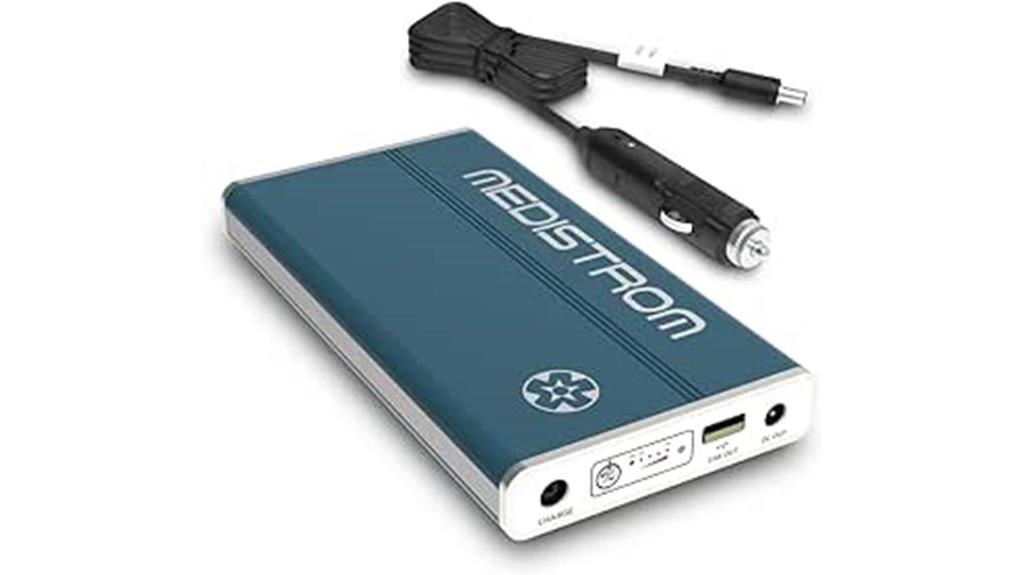
If you need a reliable portable power solution for your CPAP machine on the go, the Pilot-24 Lite CPAP Battery with Car Charger stands out with its compatibility and compact design. It provides off-grid power and includes 2 DC cables for direct connection to AirMini and AirSense 10, with additional cables sold separately for other models like AirSense 11, S9, and DreamStation Go. Weighing just 2.38 pounds and measuring 8.5 x 5.5 x 3.4 inches, it’s TSA-approved and FAA-compliant, making it perfect for travel. With up to 16 hours of use per charge, it’s durable, reliable, and ideal for camping, flights, or emergencies.
Best For: travelers, campers, and emergency preparedness users seeking a portable, reliable power source for their CPAP machines on the go.
Pros:
- Compact and lightweight design (2.38 pounds, 8.5 x 5.5 x 3.4 inches) for easy portability
- Up to 16 hours of power per charge, suitable for various travel scenarios
- TSA-approved and FAA-compliant, making it safe for carry-on luggage
Cons:
- Compatibility limited to certain CPAP models unless additional cables are purchased
- Discontinued by the manufacturer, potentially affecting availability and support
- Customer ratings average 3.9 out of 5 stars, indicating mixed user experiences
BLUETTI CPAP Battery Backup X30 297Wh Power Supply with Cables
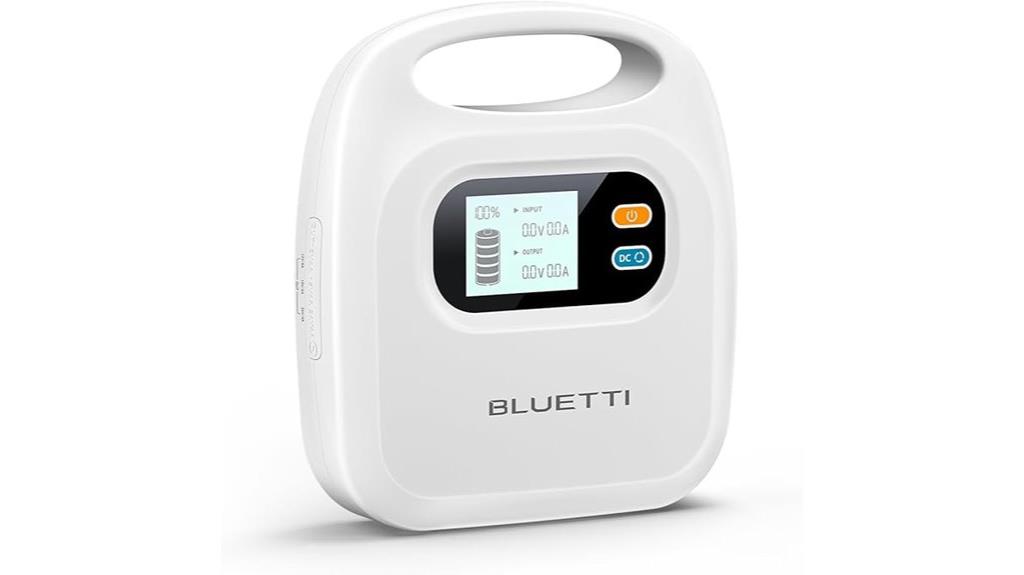
For anyone seeking a reliable portable power source to keep their CPAP running during emergencies or outdoor adventures, the BLUETTI CPAP Battery Backup X30 297Wh stands out. It provides 5-7 nights of backup power for popular devices like ResMed S9, AirSense 10/11, and Philips DreamStation. Weighing just 3.9 pounds, it’s easy to carry with its built-in handle and large accessory bag for cables. With rapid charging, multiple DC outputs, and support for solar power, it ensures safety and dependability during outages or camping trips. No batteries are included, but the unit comes with a 12-month warranty, making it a versatile, must-have travel companion.
Best For: those needing a portable, reliable backup power solution for CPAP devices during emergencies, camping, and outdoor activities.
Pros:
- Compact and lightweight design weighing only 3.9 lbs for easy portability
- Supports multiple CPAP models with a complete set of labeled cables for reliable power
- Rapid charging with support for solar power enhances safety during outages or outdoor use
Cons:
- No batteries are included, requiring an additional purchase if needed
- Limited to 297Wh capacity, which may not suffice for very long-term outages or high-power devices
- Price and availability may vary, potentially impacting affordability for some users
Factors to Consider When Choosing Battery Backup for CPAP Machine Travel
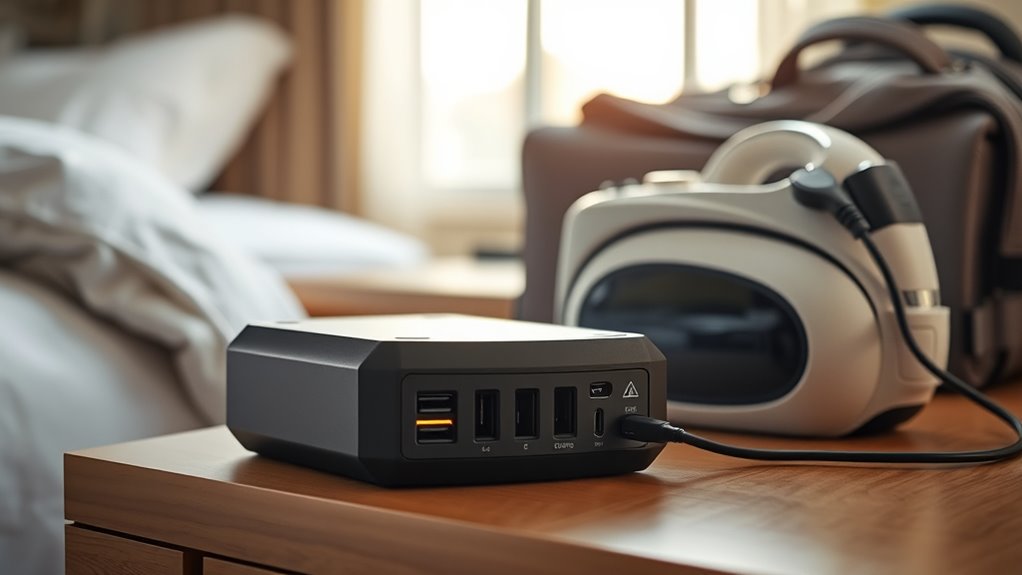
When choosing a battery backup for your CPAP during travel, I consider several key factors to ensure it meets my needs. Things like device compatibility, battery capacity, and recharge options are vital, along with size and safety. Understanding these points helps me pick a reliable backup that’s safe, portable, and ready for use anywhere.
Compatibility With Devices
Choosing the right battery backup for your CPAP machine starts with ensuring it’s compatible with your device’s specific requirements. First, check that the battery supplies the correct voltage and wattage output for your model. Using an incompatible power supply can damage your device or cause it to malfunction. Make sure the battery includes the right cables or adapters—whether DC, USB, or cigarette lighter—to connect easily to your CPAP. Verify that the battery’s capacity (measured in Wh or Ah) can support your machine’s power needs for your intended duration. Additionally, confirm compatibility with your brand and model, especially if your CPAP has features like a heated humidifier or heated tube. Finally, consider if the battery supports pass-through charging and multiple device connections for added convenience during travel.
Battery Capacity & Runtime
Battery capacity, measured in watt-hours (Wh), is essential because it determines how long your CPAP machine can run without power. A larger capacity, like 297Wh, can power your device for multiple nights, while smaller batteries around 95Wh might only support a single night. The runtime depends on your specific CPAP model, pressure settings, and whether you use additional features like humidifiers or heated tubes. To estimate how long a battery will last, divide its watt-hour capacity by your device’s wattage consumption, then account for efficiency losses. Selecting a battery with a capacity that exceeds your typical nightly use ensures reliable performance and gives you extra buffer for unexpected needs. This way, you won’t have to worry about running out of power during your travels.
Recharging Options & Speed
Recharging options and speed directly affect how practical and reliable a battery backup is during travel. Multiple methods like AC wall outlets, USB-C PD chargers, solar panels, and car adapters offer flexibility, ensuring you can recharge in various settings. Fast recharge times—typically between 2 to 6 hours—are essential for quick turnaround, especially when time is limited. Compatibility with higher-wattage chargers, such as 60W or 100W, allows for efficient recharging tailored to the battery’s capacity. Support for pass-through charging is a significant advantage, enabling the battery to recharge while powering your CPAP. Overall, having diverse recharging options and rapid speeds makes your backup more convenient, dependable, and ready whenever you need it, making your travel experience smoother and more comfortable.
Size & Portability
When traveling with your CPAP machine, size and portability are crucial factors to guarantee you can carry your backup power without hassle. I recommend choosing a battery backup that’s compact and lightweight, ideally under 10 pounds, so it’s easy to handle. Pay attention to the dimensions to ensure it fits comfortably in your carry-on luggage or travel bag. Many models feature built-in handles or ergonomic grips, making them easier to carry through airports or hotels. It’s also essential to verify that the battery size complies with airline regulations—usually under 100Wh—for cabin luggage approval. Additionally, look for a portable power supply with multiple output ports, so you can power your CPAP and other devices without adding unnecessary bulk. This focus on size and portability ensures a smooth, stress-free travel experience.
Safety & Durability
To guarantee your CPAP backup power is safe and reliable during travel, it’s essential to choose a model with high-quality, safety-certified cells like LiFePO4, which help prevent overheating, overcharging, and short circuits. Look for batteries with built-in safety features such as over-voltage, over-discharge, over-current, temperature regulation, and short-circuit protection to ensure peace of mind. Durability is equally important—opt for a tough, impact-resistant casing made of materials like aluminum that can withstand rough handling. Additionally, verify that the battery has passed safety standards and certifications like TSA or FAA compliance, especially for air travel. A reliable battery also includes a robust battery management system (BMS) that supports multiple charge cycles and guards against environmental hazards.
Power Output & Ports
Choosing a battery backup with the right power output and ports is vital for reliable travel use. I look for a device that provides at least 180W of continuous power to guarantee my CPAP runs smoothly without interruptions. It’s important to check that the battery has compatible ports, like DC output, USB-A, or USB-C, so I can connect my CPAP and other devices like phones or tablets. I also verify the maximum voltage and current ratings to match my CPAP’s power needs, preventing overloads or damage. Having multiple ports is a bonus, letting me charge multiple electronics simultaneously. Additionally, adjustable voltage options or specific adapters are essential to make sure my CPAP operates safely and effectively during travel.
Travel Regulations & Limits
Selecting a battery backup for travel means paying close attention to airline regulations and TSA guidelines. Many airlines restrict lithium-ion batteries to 100Wh for carry-on luggage, which influences your choice of backup. Batteries over 100Wh, like 148Wh or 160Wh models, often need airline approval or special handling, adding potential delays. Typically, airlines limit passengers to 2-3 portable power sources to ensure safety during flights. It’s essential to verify your airline’s specific policies before packing. Fortunately, some batteries are TSA-approved and FAA-compliant at 98Wh or below, making security checks smoother. Being aware of these regulations helps prevent confiscation or delays at the airport. Always check airline and TSA rules ahead of time to ensure your travel batteries are compliant and ready for adventure.
Price & Warranty
When evaluating battery backups for your CPAP machine, considering the price and warranty can save you headaches down the line. A longer warranty, usually between 1 to 3 years, indicates better durability and manufacturer confidence. Make sure the warranty covers repairs or replacements for issues like battery malfunction, capacity loss, or safety concerns. Check if it includes both parts and labor, and whether accidental damage is covered, not just manufacturing defects. Pay attention to terms on recharge cycles—batteries with 3000 or more cycles tend to last longer. Price differences often reflect warranty coverage and duration, so weigh whether a higher-priced option offers markedly better protection. Investing in a backup with solid warranty coverage can provide peace of mind during your travels.
Frequently Asked Questions
How Long Can These Battery Backups Power a CPAP Machine?
Most battery backups can power a CPAP machine for about 8 to 20 hours, depending on their capacity and your machine’s settings. I’ve found that smaller, portable options usually last around 8-10 hours, perfect for short trips. Larger batteries can offer up to 20 hours or more, making them ideal for longer travel or power outages. Always check the milliamp-hour (mAh) or watt-hour (Wh) rating to gauge runtime.
Are These Batteries Compatible With All CPAP Models?
Are these batteries compatible with all CPAP models? Well, if your CPAP is a vintage relic from the dawn of time, maybe not. But generally, most modern battery backups are designed to work with a wide range of models. Still, it’s always wise to double-check the specifications or ask the manufacturer—nothing kills a good night’s sleep faster than a mismatched battery. Compatibility is key, my friend!
What Is the Weight and Portability of Each Backup?
The weight and portability of each backup vary, but I find most batteries designed for travel are compact and lightweight. For example, some weigh around 2-3 pounds, making them easy to carry in a bag or backpack. I recommend checking specific models for exact weight details, but overall, these backups are built to be portable, so you can comfortably take them on your trips without adding much bulk or weight.
Do These Batteries Include Necessary Charging Cables?
Did you know that nearly 80% of CPAP users find charging cables essential? I can tell you these batteries usually include the necessary charging cables, making setup hassle-free. Most models come with a variety of adapters to fit different devices, so you won’t have to worry about hunting down the right cords. It’s a convenience that keeps your travel sleep smooth and stress-free, ensuring you’re always powered up on the go.
How Do I Maintain and Store the Batteries During Travel?
To keep my batteries in good shape during travel, I always store them in a cool, dry place away from direct sunlight. I make sure to fully charge them before my trip and periodically check their charge levels. I also keep the charging cables handy and avoid letting the batteries completely drain. Proper storage and regular maintenance help guarantee my backup power is reliable whenever I need it.
Conclusion
Choosing the right battery backup means more than just power; it’s peace of mind when you’re away from home. Imagine a silent night, free from worries about power outages, yet knowing your machine can keep running if the grid fails. It’s a balancing act—size versus capacity, portability versus longevity. When you pick the perfect backup, you turn travel uncertainty into a night of restful sleep, no matter where you are.



